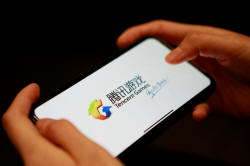|
A "healthy gaming" system that includes time limits on daily
play and can perform facial recognition-aided ID checks, already
in use on Tencent's most popular Honour of Kings smartphone
game, will be applied to nine other mobile games this year and
expanded to cover all Tencent games next year, the company said
in a post on its official WeChat account.
The move marks Tencent's latest attempt to meet the Chinese
government's call for tighter controls to combat gaming
addiction and increasing near-sightedness among young people. A
state announcement in August called for the publishing regulator
to control the number of new online video games and to limit the
amount of time young Chinese spend playing such games.
Tencent, the world's largest gaming company by revenue, has run
into regulatory roadblocks this year and Chinese authorities
have not approved any new games since March.
Without approval for in-app purchases Tencent has been unable to
make money from some of its hugely popular games, such as
PlayerUnknown's Battlegrounds Mobile (PUBG Mobile), which is a
game that CLSA estimates could generate up to $1 billion in
annual revenue if given a monetization license.
Shares in Tencent, which have slid by 28 percent this year to
knock $138 billion off the company's market value, were down 3.7
percent at Monday's close, lagging a 2 percent drop for the
benchmark Hang Seng Index.
Tencent in September announced the plan to add the real-name
registration system for new gamers on its mobile battle game
Honour of Kings. The fantasy role-playing battle game has proved
so popular that Tencent introduced restrictions to playing time
for children in July last year in response to criticism by state
media over game addiction.
Children aged 12 and under are allowed one hour a day on the
game except for a curfew period of 9pm to 8am. Minors older than
12 can play for two hours a day.
Tencent said in the Monday's post that it tried out facial
recognition-aided identity verification for new players in
Beijing and Shenzhen in September. Since October, they have been
verifying existing users' ID information and expects to complete
the process by the end of this month.
(This version of the story has been refiled to correct
typographical error in third paragraph)
(Reporting by Sijia Jiang; Editing by David Goodman)
[© 2018 Thomson Reuters. All rights
reserved.] Copyright 2018 Reuters. All rights reserved. This material may not be published,
broadcast, rewritten or redistributed.
Thompson Reuters is solely responsible for this content.
 |
|




